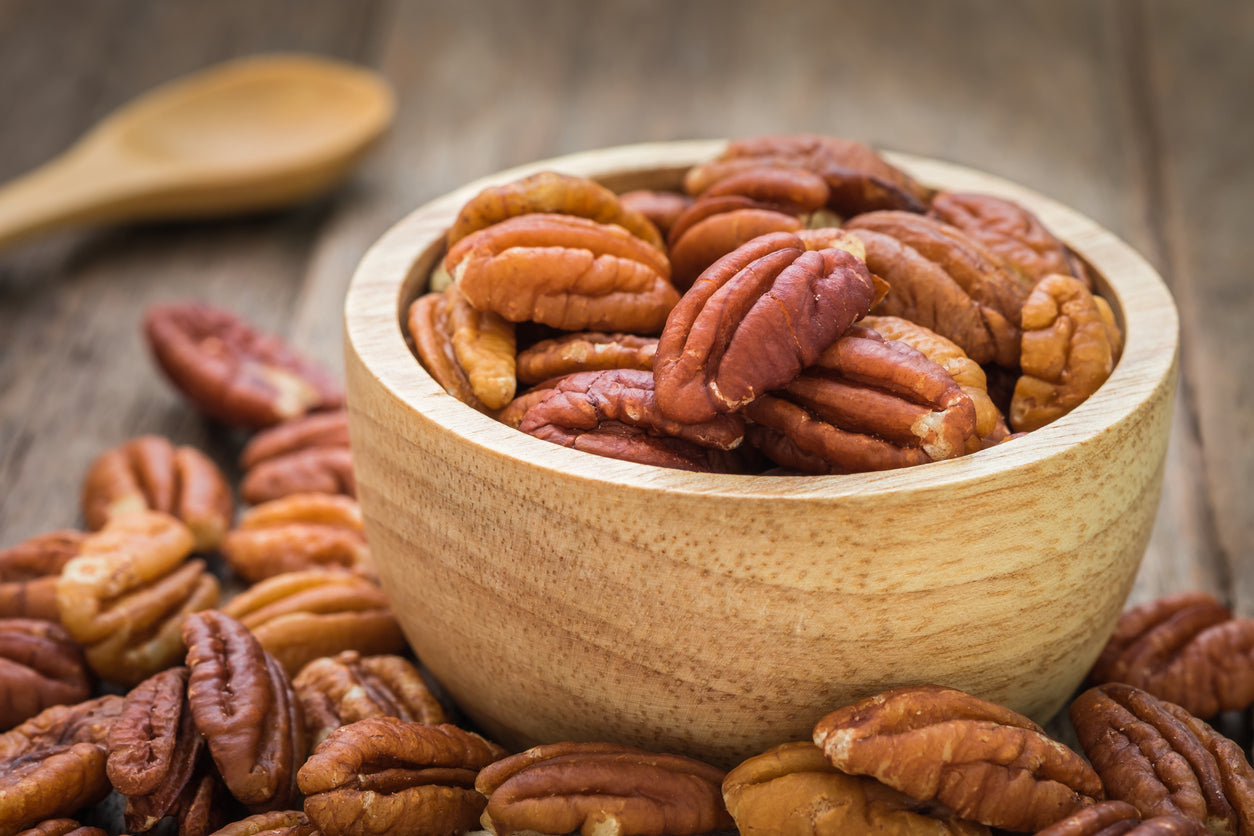Wow! Eating pecans will give you 3 important health benefits

The rich, sweet, buttery taste of pecans makes eating them feel like a guilty pleasure. But these delicious tree nuts are far from being a decadent, diet-busting indulgence.
When eaten in moderate amounts, pecans are actually a highly nutritious and healthful snack. In fact, many food experts like to classify this nut as a true “superfood” - and recent research backs up this claim. Let’s take a look at some of the unexpected benefits of pecans.
Pecans offer up a “jackpot” of nutrients
An ounce of pecans - about 20 pecan halves - packs in a lot of valuable nutrients. The serving contains 2.7 grams of fiber, 2.5 grams of protein and an impressive roster of antioxidants, vitamins and minerals.
Pecans are high in zinc, which is vital to wound healing and immune function. In fact, research has shown that diets high in zinc are linked with a lower risk of degenerative disease. And, an ounce of pecans contains a whopping 38 percent of the recommended daily intake of copper, which - like zinc - supports and strengthens the immune system.
Pecans are also a good source of manganese - an anti-inflammatory mineral that can help reduce risk of chronic degenerative disease - as well as bone-building magnesium, phosphorus and iron. In addition, powerful antioxidants - like beta-carotene and ellagic and oleic acids - help to scavenge harmful free radicals that can trigger oxidative damage and disease. Finally, pecans are rich in vitamin E - another potent antioxidant and anti-inflammatory – as well as the B vitamin thiamine, which helps convert food into energy.
While pecans are high in fat, delivering a whopping 20 grams in a one-ounce serving, the good news is that most of the fatty acids in pecans are of the healthy mono- and polyunsaturated variety.
Lower your risk of type 2 diabetes and obesity
Studies have shown that a diet high in tree nuts is linked with reduced mortality from type 2 diabetes. But has there been specific research on the ability of pecans to fight the current epidemic of diabetes and obesity?
As a matter of fact, the answer is yes!
One study involving overweight and obese adults found that eating a pecan-rich diet for four weeks increased the body’s ability to use insulin effectively, resulting in a lower A1c (a measure of blood sugar control over time). As if that weren’t impressive enough, pecan consumption also improved the function of beta cells in the pancreas, which are responsible for producing all-important insulin in the first place.
Scientists think that soluble fiber in pecans, which slows the absorption of sugar into the blood, could be responsible for the beneficial effect. As an added bonus, the fiber in pecans can help provide a feeling of fullness, or satiety, thereby helping to discourage binge eating, food cravings and overweight.
It’s official: Eating pecans can support heart health
A high intake of tree nuts is associated with a reduced risk of cardiovascular disease, and pecans can take some of the credit. For one thing, they are high in monounsaturated fatty acids, which can improve your cholesterol profile.
In a controlled trial published in Nutrients, four weeks of a pecan-rich diet lowered biomarkers of heart disease in overweight and obese adults, leading researchers to conclude that pecans can significantly lower the risk of cardiovascular disease.
A brand-new study just published in The Journal of Nutrition helps to confirm this good news. The scientists found that 68 grams (about an ounce and a half) of pecans a day improved LDL cholesterol and triglyceride levels in people at risk for heart disease. The pecans also helped to reduce levels of apoliprotein B, which many researchers consider a better predictor of heart disease than your LDL and HDL cholesterol levels.
Versatile pecans add flavor, texture and nutrients to recipes
You can use pecans to add crunch to salads, enliven yogurt, and enhance oatmeal. Or, partner them with apples, grapes, raisins or pears for a quick, energizing snack.
Convenient and portable, pecans can be nibbled “on the go,” and make a great addition to your favorite trail mix. You can also capitalize on the rich, caramel-like flavor by giving pecans a starring role in pancakes and waffles. Or, bake them into bread, muffins and cookies.
With about 200 calories per ounce, pecans are not a low-calorie food. Experts say that the key to adding pecans to your diet is consuming them not “in addition to” but “instead of” other high-calorie foods. And, of course, opt for organic pecans without any added salt or sugar.
Bottom line: In many cases, simply eating a small amount of pecans can make an excellent addition to a healthy diet.
Sources for this article include:
-
Posted in
benefits of pecans, healthy fats, heart disease, tree nuts, type 2 diabetes






